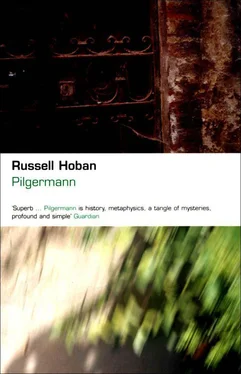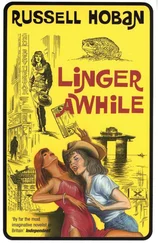Russell Hoban - Pilgermann
Здесь есть возможность читать онлайн «Russell Hoban - Pilgermann» весь текст электронной книги совершенно бесплатно (целиком полную версию без сокращений). В некоторых случаях можно слушать аудио, скачать через торрент в формате fb2 и присутствует краткое содержание. Год выпуска: 2002, Издательство: Bloomsbury Publishing PLC, Жанр: Современная проза, на английском языке. Описание произведения, (предисловие) а так же отзывы посетителей доступны на портале библиотеки ЛибКат.
- Название:Pilgermann
- Автор:
- Издательство:Bloomsbury Publishing PLC
- Жанр:
- Год:2002
- ISBN:нет данных
- Рейтинг книги:5 / 5. Голосов: 1
-
Избранное:Добавить в избранное
- Отзывы:
-
Ваша оценка:
- 100
- 1
- 2
- 3
- 4
- 5
Pilgermann: краткое содержание, описание и аннотация
Предлагаем к чтению аннотацию, описание, краткое содержание или предисловие (зависит от того, что написал сам автор книги «Pilgermann»). Если вы не нашли необходимую информацию о книге — напишите в комментариях, мы постараемся отыскать её.
Pilgermann — читать онлайн бесплатно полную книгу (весь текст) целиком
Ниже представлен текст книги, разбитый по страницам. Система сохранения места последней прочитанной страницы, позволяет с удобством читать онлайн бесплатно книгу «Pilgermann», без необходимости каждый раз заново искать на чём Вы остановились. Поставьте закладку, и сможете в любой момент перейти на страницу, на которой закончили чтение.
Интервал:
Закладка:
These Franks encamped before our walls, they have come as the seasons come or as old age and death come; in their time they are there, they are not to be avoided. Antioch stands between them and Jerusalem; it cannot get out of their way nor can they afford to bypass it and leave a fortified enemy in their rear.
We have heard of the coming of the Franks; we have heard of them at Constantinople, we have heard how one of them sat himself down on the throne of Alexius Comnenus and told the Emperor that in his own country he had waited in vain at the crossroads for anyone to answer his challenge to single combat.
I have told how the price of a bale of silk went up by three dinars in Tripoli when the Franks arrived in Constantinople. When they besieged Nicaea and Nicaea surrendered to the troops of Alexius the price of silk went up by one more dinar. ‘Last time it was uncertainty of supply that sent the price up,’ said Bembel Rudzuk; ‘this time the sheep are not so frightened of the wolf as they were; some of the sheep are saying that this is not a devouring wolf, it is a buying wolf.’
From Dorylaeum, from Heraclea, from Marash the wave of their coming ran ahead of the Franks. We heard of Baldwin in Edessa, how he became co-regent with Prince Thoros of Edessa and how Thoros ended up with his head on a pole. After Dorylaeum the price of silk went back to where it had been before the Franks arrived in Constantinople; it paused there, then dropped by one dinar. ‘Perhaps this is after all that end-of-the-world wolf of whom one has heard,’ said Bembel Rudzuk. ‘Perhaps this is the wolf who will swallow the sun. The market has become a swamp, a mire, a bog, a place with no firm ground whatever. The beggars are tying up their bundles and the great houses are closing the shutters.’
It was the victory at Dorylaeum that made everyone begin to wonder whether the battle cry of the Franks, ‘God wills it!’, might be a true statement of how things were. Perhaps God did will it. Or perhaps they were simply lucky. But what was luck if not the will of God? There were those in Antioch who dedicated themselves unsparingly to the pondering of that question, and if the smoking of water pipes and the drinking of strong coffee could have repelled the Franks the city would never have been in danger.
It was pondered that at Dorylaeum the Franks had behaved so stupidly that almost it seemed the paradigm of a mystery not to be understood by the unfavoured. To divide their host into two columns not in communication with each other! To separate the foot-soldiers from the cavalry as they had done! To fall back upon the tents in panic and to be saved at the last moment by the arrival of the other half of the army! Did the two columns symbolize Jesus the son and God the father? Body and soul? Adam and Eve? Sulphur and Mercury? There were as many opinions as there were ponderers.
Yaghi-Siyan, uncertain of God’s will, sent for help to Rudwan of Aleppo, to Duqaq of Damascus, to Karbuqa of Mosul. Rudwan said no; Duqaq said yes, as did his atabeg Tughtagin and Janah Ad-Dawla of Horns; Karbuqa also said yes. Yaghi-Siyan, hoping for quick relief, then organized his defences, laid in supplies, and made ready to become history.
It is to be assumed that the soldiers of Christ all thought of God as He, and to them it soon became evident that He did not will that Antioch should fall too quickly. I too out of habit still thought of him sometimes as He but mostly I recognized him as It, the raw motive power of the universe; and I was able to see in the systole and diastole of the siege of Antioch the reciprocal action of that asymmetry without which there would be only stillness and silence.
The four-hundred-towered walls built by Justinian and kept in good repair by the Byzantines were the pivot of the action; they were the fixed point at the centre of that particular dance; they would not give way, they would go on yet awhile defining an inside and an outside. Yaghi-Siyan on the inside still had enough food but not enough men; he could neither defend his walls at every point nor could he go out and defeat the Franks in one decisive battle.
The Franks could take up positions only on three sides of Antioch; they were prevented on the fourth side by Mount Silpius which kept a back door open for the besieged. As the Franks ran out of food some of them, like sparrows, picked through manure for the grain in it; some died of starvation; some deserted. They were always foraging through a countryside more and more empty of everything except Turks in ambush and they had of course to beat off such armies as came to relieve Antioch. Yaghi-Siyan made sorties when circumstances favoured; there were many engagements major and minor; history was daily sown like a crop to be harvested in its season.
Having thought of history as a crop that was sown I am left with the image of sowing but the picture in my mind is not one of seeds flung from the hand of the husbandman; it is of heads flung from the missile-throwing machines on both sides. Heads! Human heads that have spoken, kissed, whistled, eaten, drunk, done all those things that only heads can do! Heads as missiles! The heads slung into Antioch by the Franks were the heads of Turks killed in battle but the heads slung out of Antioch by the Turks were not those of Franks; they were the heads of Syrian and Armenian Christians of Antioch.
Those Syrian and Armenian Christians of Antioch and the country roundabout, I know not quite how to think of them, how to hold them in my mind. Until 1085 Antioch had been part of Byzantium, but as the tide of Byzantium ebbed they found themselves stranded on a beach that belonged to Qilij-Arslan. Sometimes I think of them as being like those little shore birds that run on long legs, crying as they glean the tideline. They were never static, never inactive, those Christians of that place and that time, they filled in whatever unoccupied spaces of action they found. They were constantly going backwards and forwards between the Franks and the Turks: sometimes they spied on the Franks for the Turks; sometimes they spied on the Turks for the Franks. When the Franks were starving those busy Christians in the country around Antioch sold them provisions at what might be called Last Judgment prices which effectively sorted out those who could afford to live from those who could only afford to die. Those same Christians, when they found Turks in flight from an engagement with the understandably testy Franks, ambushed the Turks and so struck a rough balance in their dealings with both sides. They had no peace, those Christians, they had no rest, they were continually gleaning that shimmering tideline against a background of towering breakers. The churning of the times they lived in had imparted to them a motion they could not resist, they were compelled by forces beyond them to keep moving in all directions and to be incessantly busy in many ways.
There came a particular day that winter when the Franks ambushed the Turks who were planning to ambush them. We were told that seven hundred Turks died that day while the Franks had no losses whatever. It was a cold grey day, the tents and awnings of the Hidden Lion bazaar was snapping in the wind; it was one of those grey days, it was one of those winds when no matter how many people gather together each one of them looks utterly alone and too small under a sky that is far, far too big. Little leaning pitiful figures. The tax-collector that day was pacing with ostentatious self-importance, like a man who knows that people breathlessly await his words.
There came to Hidden Lion then Yaghi-Siyan riding on his horse, his bodyguard with him as always. They were followed by a mule-cart covered with a tent-cloth. Yaghi-Siyan rode clip-clopping on to the tiles with the bodyguard clip-clopping after him and the mule-cart rumbling behind. He wore a helmet and a mail shirt with a gold-worked green robe over it. One couldn’t tell whether he had been in the battle or not; he looked fresh and clean. He had a bow slung on his shoulder; I had never seen him carry a bow before; he looked as if at any moment he expected to have to fight or fly for his life. His face was wild with rage and (I thought) with despair. He looked all around him while his horse danced and tossed its head. (How strange, I thought, to be a horse; one might be carrying on one’s back anything at all to anything at all: chaos to order; betrayal to trust; defeat to victory; death to life.)
Читать дальшеИнтервал:
Закладка:
Похожие книги на «Pilgermann»
Представляем Вашему вниманию похожие книги на «Pilgermann» списком для выбора. Мы отобрали схожую по названию и смыслу литературу в надежде предоставить читателям больше вариантов отыскать новые, интересные, ещё непрочитанные произведения.
Обсуждение, отзывы о книге «Pilgermann» и просто собственные мнения читателей. Оставьте ваши комментарии, напишите, что Вы думаете о произведении, его смысле или главных героях. Укажите что конкретно понравилось, а что нет, и почему Вы так считаете.












